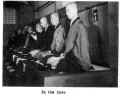The sutras and chants in Japanese
(transliteration)
and English as presented in
the Booklet from
The Way of Eiheiji: Zen Buddhist Ceremony
A two record box set put out by Folkways Records in 1960
Created by Elsie and John
Mitchell
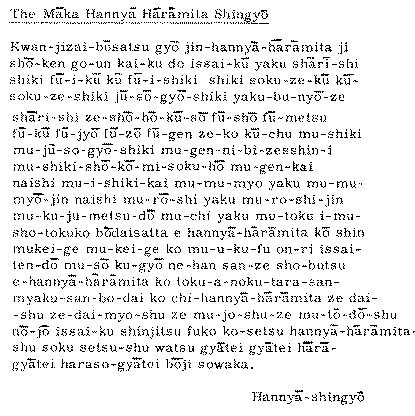
Hannya Shingyo
When the Bodhisattva was in deep meditation, he clearly perceived that the five components of being are all Sunya and so he was saved from all kinds of suffering. (Then he said to Shariputra)
"0 Shariputra! Phenomena are not different from Sunya and Sunya is not different from phenomena. Phenomena are Sunya and Sunya is phenomena.
"0 Shariputra, all is Sunya. Nothing comes into existence nor passes out of existence. There is no purity and no impurity; no increase nor decrease. Therefore in Sunya there is no form. no
9
sensation, no thought, no volition, no perception; there is no eye, ear, nose, tongue, body, mind; and there is no form, sound, odor, taste, touch, nor consciousness. There is neither field of vision nor field of thought and consciousness.
"In Sunya there is no ignorance and no extinction of ignorance. There is neither decay nor death; nor is there termination of decay and death; there is no suffering, no source of suffering, nor annihilation of suffering, and no path to the annihilation of suffering.
"In Sunya there is no knowledge, likewise no attainment in knowledge as there is nothing to attain.
"The mind of the Bodhisattva which has found its source in the Prajna Paramita is without hindrances and he has no fear. Going beyond all hindrances and illusions he reaches Perfect Enlightenment.
"All the Buddhas of the past, present and future have found their source in the Prajna Paramita; they have found Perfect Enlightenment."
Therefore we know that the Prajna Paramita is the Great Gatha, the Gatha of Great Wisdom, the Supreme Gatha, the unequaled Gatha which is capable of removing all suffering.
Because of its truth, we make known the Prajna Paramita Gatha which is:
Strive, strive constantly towards the goal of Perfect Wisdom, Sowaka. (So may it be)!
Trans. S. Ihara & K. Matsunami
Every morning after meditation, the monks chant this verse three times. When the chanting is finished, the kesa (Buddha robe) is donned.
Takkesa-Ge
Dai-zai ge-da buku
Muso fuku den-e
Hibu Nyo-rai-kyo
Kodo sho-shujo
How great the privilege of wearing the Buddhist robe!
The phenomena transcending kesa (robe)!
I will follow the Buddha's teaching
And help all beings on the way to Enlightenment
Trans. S. Ihara
This verse is used in the Fusatsu ceremony.
Shiguseigan
Shujo muhen Seigando
Bonno mujin Seigandan
Homon muryo Seigangaku
Butsudo mujo Seiganjo
Sentient beings are countless;
I vow to enlighten them.
Human suffering is immeasurable;
I vow to end it;
The Dharma is infinite;
I vow to study it.
The path of the Buddha is ever beyond;
I vow to follow it.
Trans. K. Matsunami
The verses recited at meal time - jikiji-ho
Before meals
The Buddha was born at Kapilavastu,
He was enlightened at Magadha,
He preached at Paranasi.
He died at Kusinagara
I now open the Tathagatas
Eating bowls for my meal.
May I - as well as all others -
Be delivered from self-clinging.
Trans. T. Inoue
We venerate the Three Treasures!
And we are grateful for this meal
Which is the result of the work of other people
and the suffering of other forms of life.
Homage to the pure Dharmakaya - Vairocana -Buddha;
To the complete Sambhoga-kaya-Vairocana- Buddha
To the numerous Nirmana -kaya -Sakyamuni -Buddhas
To the future Maitreya-Buddha
To all Buddhas, past, present, and future all over the world
To the Mahayana -Saddharma- Pundarika - Sutra
To the great Manjusori Bodhisattva
To the Mahayana-Samantabahadra-Bodhisattva
To the great compassionate Avalokitesvara-Bodhisattva
To the many Bodhisattva Mahasattvas
To the Maha- Prajna - Paramita
When rice-gruel is served, this verse is chanted
The rice gruel has many advantages
which people may benefit from
The benefits are immeasurable
And lead us to the ultimate imperishable comfort.
First I reflect on the coming meal and from whence it comes;
Secondly I receive the gift, taking into consideration my imperfections;
Thirdly, I wish to control my mind that I may not cling to anything;
Fourthly, I will eat this food in order to remain in good health;
Fifthly, in order to become awakened I will take this meal.
O you of the spiritual worlds,
I offer this to you.
May this food give pleasure
To all the spirits of the ten quarters. (Chanted only at lunch)
May we offer the meal to the 3 ratnas [Buddha, Dharma & Sangha],
and to all sentient beings.
We take the first spoon of rice in order to abolish all kinds of evil;
We take the second spoon of rice in order to practice all kinds of goodness;
We take the third spoon of rice in order to save all creatures.
And may all beings attain Enlightenment.
10
After meals
The water with which we wash the bowls is like ambrosia;
May we offer this water to those of the spiritual worlds
That they may be satisfied.
We are in the world like Ether [which has no limit]
May our minds transcend this world
As the lotus-flower raises itself above the muddy water.
Homage to the highest Teacher!
Trans. S. Ihara and C. Horioka
[Transliteration of the Japanese]
Before meals
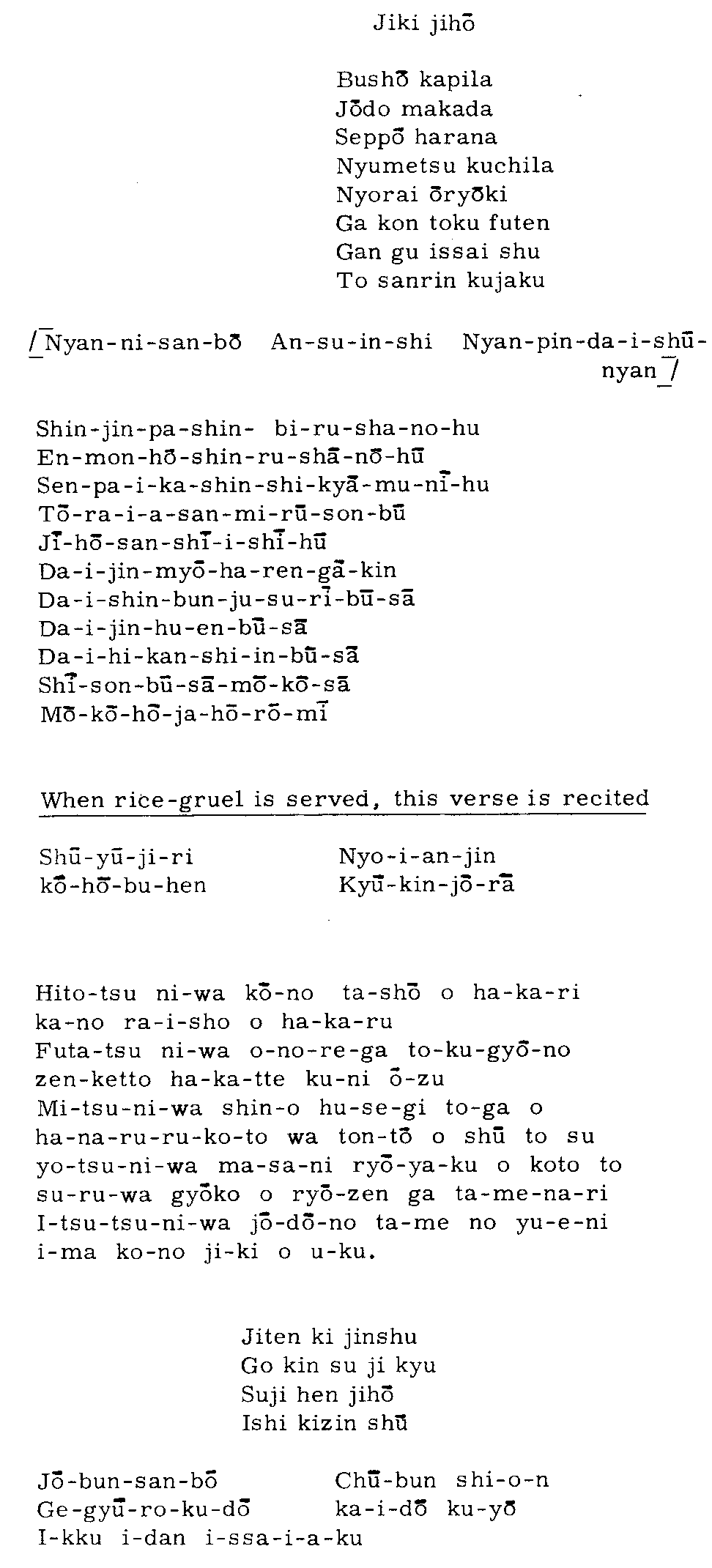
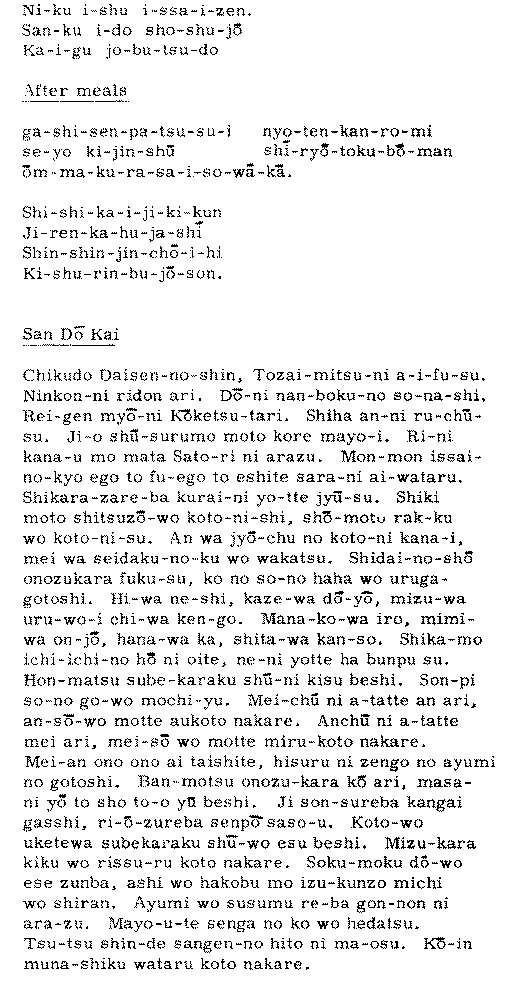
San Do Kai
The Union Of The Phenomenal And Spiritual Worlds
Those who attain enlightenment meet the Shakyamuni Buddha face to face. There are differences in human personality; some men are clever and others not. The teachings of the masters of the South and North are but different expressions of the same thing. The source of the teachings is clear, and though the tributaries are muddy, the awakened mind returns to the source. Clinging to practice, there is still suffering; clinging to reason will not produce Satori.
When they enter the gates of the senses, interdependent phenomena appear unrelated. Phenomena are interdependent and, furthermore, interpenetration takes place. If there were no interpenetration, there would be no escape from differentiation.
The characteristics of form are different; pleasure and suffering appear unrelated. For the awakened, superior and inferior cannot be distinguished; for the unawakened, only duality is apparent.
12
The four elements return to their source, as children return to their mother Fire heats; wind moves; water wets; earth supports. For eyes, there is form and color (rupa); for ears there is sound; for the nose there is smell; for the tongue there is taste. Without these organs, we cannot experience the phenomenal world. All the leaves on a tree are dependent on the root. All differentiations arise from the same origin. All expressions describe the same reality.
In the phenomenal world, there is enlightenment. In enlightenment can be found the phenomenal world. The two cannot be separated; they intermingle. The phenomenal and enlightened worlds depend on each other like backward and forward steps. Everything has it's use though values vary with time and place. Reality and ideality must meet, as did the arrows of Hiai and Kisho.
When we hear words, we should trace their source. We shouldn't cling to words, their spirit only is important. The visible world is only a path. As we proceed we must realize that this is all we need to know.
We are always on the path; Satori is neither near nor far. Since we cannot see the path, Satori always seems a distant goal. Those who are seeking the way, may I advise them not to waste any time.
Trans. S. Ihara and K. Matsunami
The names of the Buddhas and Patriarchs
recited in the morning service
1. Bibashi-butsu Daiosho
2. Shiki-butsu Daiosho
3. Bishafu-butsu
Daiosho Kako shichibutsu
4. Kuruson-butsu
Daiosho (The Seven Buddhas
5. Kunagonmuni-butsu
Daiosho of the Past)
6. Kashobutsu Daiosho
7. Shakamuni-butsu
Daiosho
(Historical Buddha 560 B.C.)
8. Makakasho Daiosho
9. Ananda Daiosho
10. Shonawashu Daiosho
11. Ubakikuta Daiosho
12. Daitaka Daiosho
13. Mishaka Daiosho.
14. Vashumitsu Daiosho
15. Butsudanandai Daiosho
16. Fudamitta Daiosho
17. Barishiva Daiosho
18. Funayasha Daiosho
19. Anabotei Daiosho
20. Kabimora Daiosho
21. Nagyaarajuna Daiosho
22. Kariadaiba Daiosho
23. Ragorata Daiosho
24. Sogyanandai Daiosho
25. Kayashata Daiosho
26. Kumorata Daiosho
27. Shayata Daiosho
28. Vashuhanzu Daiosho
(Vasubandhu)
29. Manura Daiosho
30. Kakurokuna Daiosho
31. Shishibodai Daiosho
32. Bashashita Daiosho
33. Funyornitta Daiosho
34. Hannyatara Daiosho
35. Bodaidarma
Daiosho
Chinese Patriarchs
36. Taiso eka Daiosho
37. Kanchi Sosan Daiosho
38. Daii Doshino Daiosho
39. Daiman Konin Daiosho
40. Taikan Eno Daiosho
41. Seigen Gyoshi Daiosho
42. Sekito Kisen Daiosho
43. Yakusan Igen Daiosho
44. Ungan Donjo Daiosho
45. Tozan Ryokai Daiosho
46. Ungo Doyo Daiosho
47. Doan Dohi Daiosho
48. Doan Kanshi Daiosho
49. Ryozan Enkan Daiosho
50. Taiyo Kyogen Daiosho
51. Toshi Gisei Daiosho
52. Fuyo Dokai Daiosho
53. Tanka shijun Daiosho
54. Choro Seiryo Daiosho
55. Tendo Sogaku Daiosho
56. Seccho Chikan Daiosho
57. Tendo Nyojo Daiosho
58. Eihei Dogen
Daiosho
First Japanese Patriarch
59. Koun Ejo Daiosho
60. Tettsu Gikai Daiosho
61. Keizan Jokin
Daiosho
The founder of Sojiji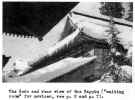
The Sodo and rear view of the Sapin
click thumbnail to enlarge
(waiting room for novices)
12
